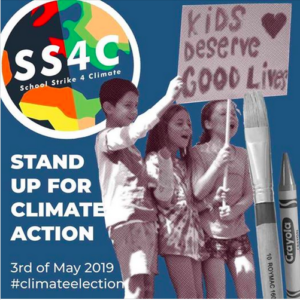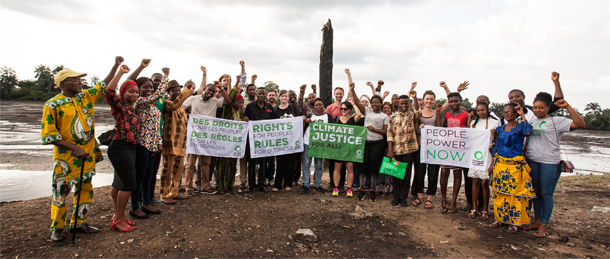Apr 24, 2019: FoE Australia media release

The federal election will be held on May 18. With climate change already bearing down on us, a recent decision by the government of Scott Morrison to sign off on Commonwealth approvals for the Adani Carmichael coal mine, and a robust debate about energy and renewables, there is no doubt that this will be the #climateelection.
Elections are a time to remind all parties that they need to deliver solid action on climate change and the environment.
The following are our key policy proposals for the 2019 federal election.
Listen to the science

Climate science makes it abundantly clear that if we want to have a hope of avoiding dangerous climate change we must stop digging up fossil fuels.
Parties must:
- Commit to stopping the Adani Carmichael coal mine in Queensland
- Commit Australia to 100% renewable energy by 2030
- Rule out coal-to-hydrogen technologies in any plan to develop a hydrogen industry
- Rule out supporting or funding experimental waste-carbon injection (carbon capture and storage) projects
- Rule out releasing further offshore oil and gas exploration licenses, as NZ/ Aotearoa has done
- Support the No More Bad Investments legislation
- Rule out forcing the medium level radioactive waste dump on unwilling communities
Start the transition
 The time for coal is over. We need to transform our economy. We need to take everyone with us – this means supporting sectors and communities which will be on the frontline of structural change.
The time for coal is over. We need to transform our economy. We need to take everyone with us – this means supporting sectors and communities which will be on the frontline of structural change.
At the federal level, this includes the need to:
- Extend the existing national Renewable Energy Target (RET) beyond 2020, with the addition of policies to encourage the rollout of energy storage
- Enshrine action on climate change in the National Electricity Market (NEM) rules to guide the transition to renewable energy
- Establish a public authority Transition Australia to guide the shift to 100% renewable energy in the electricity sector and provide transition programs for people in areas that have historically been dependent on coal mining
- Get the Climate Change Authority to undertake an immediate update of Australia’s carbon budget and the emissions cuts needed to limit warming to 1.5oC
- Each year, the impacts of climate change grow. Parties should commit to running a ‘Climate budget’ – where economic decisions are guided by climate science, the government keeps track of the economic and social costs of climate change, and considers and includes these impacts in its budget
- Getting on with the development of the Star of the South offshore wind project in Victoria and establishing a policy framework to encourage the development of the offshore wind sector and create jobs
- Upgrade transmission infrastructure to enable a 21st Century grid powered by 100% renewables
- Supporting the call to fund the Clean Energy Finance Corporation (CEFC) to the tune of $10 billion and expanding the CEFC’s mandate to invest in cutting emissions in other sectors (transport, land-use, etc). This would require adjusting the requirement to deliver a commercial return on investment (ROI) for taxpayers
- Axing the pointless “Energy Security Board” and use the money to fund the rollout of renewables and storage
Build community and ecological resilience
 We are already locked into unavoidable climate change. Governments must help human and natural communities to adapt and thrive in the conditions we will face in coming decades. In the short term, this should include:
We are already locked into unavoidable climate change. Governments must help human and natural communities to adapt and thrive in the conditions we will face in coming decades. In the short term, this should include:
- Supporting a national inquiry into the economic impacts of climate change, including impacts of natural disasters on cost and availability of household and commercial insurance
- Establishing a national community climate grants scheme with a $100m pilot to support local communities to build resilience in the face of climate change
- Undertake an update of the risks to Australia’s coastline from rising sea levels (the original report was initiated by Minister Penny Wong in 2009)
- Emergency measures to deliver drinking water to communities along the Darling River
- Implement the recommendations of the South Australian Royal Commission into the Murray Darling Basin Plan and conduct a Federal Royal Commission that builds on the South Australian Royal Commission
- Scrap the Cap on water buybacks
- Overturn the Sustainable Diversion Limit (SDL) adjustment and compulsorily acquire water from irrigators for the environment if need be
- Implement the recommendations of the Australian Academy of Sciences investigation into the fish kill along the Darling River
Build green
Australia desperately needs green transport infrastructure and services:
- In Victoria, the federal government must commit a fair share to vital public transport projects like Melbourne Metro 2, the Suburban Rail Loop, the airport link, duplicating single-track sections of the metro train network, and untangling lines so that regional rail services have dedicated tracks that don’t impact the Metro network, etc
- It means prioritising money for public transport, not roads. To reduce emissions we must end bad investments in polluting roads-based transport
- and ramping up money for low-emissions efficient mass transport and switching to electric trucks and vehicles.
Think global
On a per capita basis, Australia radically over consumes and over pollutes. We must accept the need to live within the limits of the planet. In the short term, we must:
- Significantly ramp up our national emissions reduction targets, as called for urgently by the UNFCCC, in order for any possibility of keeping global temperature increases below 2oC
- Sign the Global Compact on Migration to support climate displaced people, especially in the Pacific Island region
- Restore Australia’s regular contributions to the Green Climate Fund to support the mitigation and adaptation efforts of countries in the global south
- significantly increase our contribution to International Development Assistance (aid budget), with 0.7% as the target.
Get active
Check the work of our national project Tipping Point.
Tipping Point is working to help build a people-powered movement which can take sustained, bold, and creative action that will drive the social and political change our climate so desperately needs.
Climate strike
May 3 #ClimateElection National Day of Action – students from around the country will be striking from school and protesting outside Federal MP offices. They are inviting all of us to join them.
Full details here.


Authorised by Cam Walker, Friends of the Earth, 312 Smith St, Collingwood.
Whilst you are here, please make a tax deductible donation. Friends of the Earth relies on donations from people like you to keep running campaigns for social and environmental justice.



 The time for coal is over. We need to transform our economy. We need to take everyone with us – this means supporting sectors and communities which will be on the frontline of structural change.
The time for coal is over. We need to transform our economy. We need to take everyone with us – this means supporting sectors and communities which will be on the frontline of structural change. We are already locked into unavoidable climate change. Governments must help human and natural communities to adapt and thrive in the conditions we will face in coming decades. In the short term, this should include:
We are already locked into unavoidable climate change. Governments must help human and natural communities to adapt and thrive in the conditions we will face in coming decades. In the short term, this should include:

 On the 3rd of May, there are School Strikes being organised at 5 different MP Offices
On the 3rd of May, there are School Strikes being organised at 5 different MP Offices